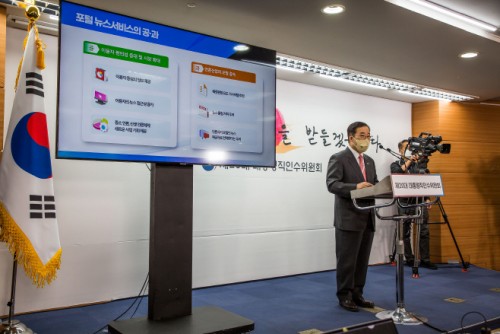 |
| People Power Party lawmaker Park Seong-joong, former secretary of the subcommittee for science, technology, and education under the presidential transition team, is briefing on the policy direction to enhance the reliability and transparency of portal news services at the transition committee press conference in Seoul on May 2, 2022./ Source: Yonhap News |
AsiaToday reporter Kim Na-ri
The Yoon Suk-yeol government is expected to push for a plan to transform External News Partnership Evaluation Committee of Naver and Daum Kakao, which have been under fire for ruling over the media, into a legal body within the portal companies.
The Korea Communications Commission (KCC)’s ‘Consultative Group for Improvising Portal News Reliability and Transparency’ underwent a major operation on the Evaluation Committee, which has been constantly controversial over fairness and transparency, and is now discussing ways to transform it into a legal organization within the portals rather than an external private autonomous one.
However, it is pointed out that the transformation of the evaluation committee to an internal body is only a temporary remedy as it maintains the monopolistic practice of gigantic portals such as Naver evaluating and rating the media.
According to the relevant industry on Tuesday, the KCC is reportedly planning to transform the Evaluation Committee and the Algorithm Transparency Committee, which are involved in operating portal news, to a statutory organization from private autonomous organization.
The ‘Consultative Group for Improvising Portal News Reliability and Transparency’ held four meetings until last week to discuss system improvements for the Evaluation Committee and the Algorithm Transparency Committee.
While the media and the two major portals, Naver and Kakao, are reviewing news partnership through the evaluation committee, it has been pointed out that the portals have been avoiding direct responsibility by putting forward the evaluation committee. The Algorithm Transparency Committee, which serves to verify article arrangement and exposure standards and disclose the results, has been criticized for being opaque and arbitrary in its standards.
The portal news utilization rate has reached 79.2 percent as of 2021, and the need for policy measures to form a balanced public opinion is growing as problems in news service delivery methods and news consumption issues such as confirmation bias are being raised.
PPP’s Park Sung-joong, former secretary of the subcommittee for science, technology, and education under the presidential transition team, introduced the ‘policy direction for enhancing the reliability and transparency of portal news services' in May, and said, “Portals decide whether or not to cancel the partnership contract with the media through the evaluation committee.” Park pointed out that the portals are too closed while holding the leash of the media.
As a result, the consultative group agreed to place the evaluation committee, which caused controversy over fairness, inside the portal operators, but setting up individually by operator. Regarding article affiliation, there are concerns that regulating the scope of affiliation may limit business autonomy. But at least in the case of search affiliation, there are voices calling for removal of restrictions so that articles from all registered media companies can be searched for diversity.
The consultative body also proposed making it mandatory to disclose the verification results in relation to algorithm improvement.
However, some claim that the establishment of the evaluation committee for each portal operator means returning to 2014, before the establishment of the evaluation committee, and that it should be abolished as it cannot be a fundamental solution.
#portal reform #evaluation committee #Naver
Copyright by Asiatoday
Most Read
-
1
-
2
-
3
-
4
-
5
-
6
-
7





















